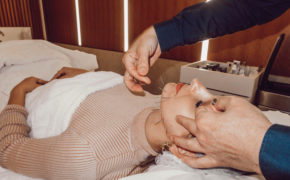Having a bad thin hair day?
Ever since I was a little girl, I had thin hair. Curly, but lacking volume, dry and difficult. I’ve treated it badly with straightening irons, dyeing it, no protection whatsoever and bad routine or non at all. Now I am reaping the consequences, sadly. Everyone loses hair. It happens during your morning shower, while you’re blowing it dry, or when you give it a quick brush—and that’s normal.
On average, we lose fifty to a hundred hairs a day. That’s just hair going through its cycles, and there will be a new one to replace it. But hair loss may be a sign of a more serious medical condition that needs an evaluation by a dermatologist and possible treatment. The average age for women dealing with thinning hair is 25 to 35. The total number of hairs doesn’t always decrease, but the diameter of each strand shrinks. And too-thin hairs won’t grow past a certain length — which explains the baby fuzz around my hairline.
According to Marie Claire and ABC news, the causes for loosing your hair are:
[box type=info]You can loose your hair after pregnancy, major surgery, drastic weight loss, or extreme stress, in which you shed large amounts of hair every day, usually when shampooing, styling, or brushing. It can also be a side effect of certain medications, such as antidepressants, beta-blockers, and non-steroidal anti-inflammatory drugs.[/box]
[box type=info]Hair loss that is genetic is known as androgenetic alopecia and is the most common cause of hair loss. The gene can be inherited from either your mother’s or father’s side of the family, though you’re more likely to have it if both of your parents had hair loss. [/box]
[box type=info] Millions of people, most of them women, suffer from thyroid disease. Thyroid hormone is responsible for everything from your basal metabolic rate—the rate at which your body uses oxygen and energy to function—to the growth of your hair, skin, and nails. But when you don’t have the right amount, you may notice changes in bodily functions.
Also, lupus is a chronic autoimmune disease in which the body’s own immune system attacks healthy tissues. The condition affects about 1.5 million people and tends to strike women during their childbearing years. Many people also experience hair loss, which may be mild and occur while shampooing or brushing your hair.[/box]
[box type=info]Women who have heavy periods or don’t eat enough iron-rich foods may be prone to iron deficiency, in which the blood doesn’t have enough red blood cells. Red blood cells transport oxygen to cells throughout your body, giving you the energy you need. Iron deficiency anemia causes extreme fatigue, weakness, and pale skin. You may also notice headaches, difficulty concentrating, cold hands and feet, and hair loss.[/box]
[box type=info]As many as five million women in the United States suffer from polycystic ovarian syndrome, causing facial hair growth, irregular periods, acne, and cysts on the ovaries. And while you may experience hair loss on your scalp, you may notice more hair elsewhere on the body. [/box]
[box type=info] An unhealthy scalp can cause inflammation that makes it difficult for hair to grow. Skin conditions that lead to hair loss include seborrheic dermatitis (dandruff), psoriasis, and fungal infections such as ringworm.[/box]
[box type=info] Alopecia areata is an autoimmune disorder in which the immune system attacks hair follicles. It affects about 4.7 million people in the United States and occurs equally in men and women. The cause is unknown, but it may be triggered by stress or illness.[/box]
[box type=info]Too much shampooing, styling, and dyeing can harm your tresses. Heat and chemicals weaken the hair, causing it to break and fall out. Often, it’s a combination of treatments—keratin, coloring, and blow-drying, for instance—that does the damage. [/box]
I had to do some research, testing lots of products before coming up with a good routine that will make my hair healthy and will look much plumper, shiny and it will give me back the confidence I needed. What are the most important ways to treat hair loss and thicken it? [box type=ok] Select chemical-free hair products. Replace shampoo with sulfates for sulfate-free shampoo. Sulfates are harsh cleansers that are effective at stripping away the oils in your hair. The problem is that without the protection of natural oils, hair gets easily damaged and frayed. Choose a shampoo made with oils and natural cleansers that won’t be too harsh for your hair. The same goes for conditioners. The best ones are made with coconut oil, aloe and other natural components. You can also try substituting an apple cider vinegar solution that will make your hair soft, supple and shiny. Apply sparingly hair sprays, gels and other chemicals.
Handle your hair gently. Hair is soft and fragile, and if you’re trying to grow it as thick as possible, it’s important not to treat it too roughly. Wash it less frequently, so it won’t loose the natural oils that coat it. Three or four times a week should be enough and you can also use dry shampoo to freshen it up. Blot your hair dry. Instead of wringing it out and roughly toweling it, use a soft towel to gently squeeze your hair. Use a wide toothed comb instead of a brush to work out the tangles gently.
Stop using heat. Styling tools like hair dryers, straightening irons, and curling irons are tough on hair. Use them sparingly or forego them altogether.
Let your hair be its natural self. Bleaching, highlighting and coloring your hair can cause it to fall out or become dry and brittle.
Get regular trims. Trimming your hair gets rid of dull, damaged ends and adds new life and volume to your hair. Shorter cuts and layered cuts, especially, can make your hair appear to be thicker than it looks when it’s long and untrimmed.
Eat a nutritious diet. If you have a diet devoid of essential nutrients, it shows in the volume and texture of your hair. Thick, voluminous hair depends on a healthy diet filled with vitamins and minerals that cause your hair to grow strong. Get plenty of protein by eating a lot of fish, lean meat, nuts and eggs. Eat omega-3 fatty acids like sardines, walnuts, avocado. Spinach and other leafy greens are also amazingly full of vitamin C great for your hair.
Protect your hair from environmental damage. Everyday activities you don’t think twice about may be causing your hair to become brittle and thin. Kee it out of the sun, protect if from pollution by wearing hats. Also, don’t expose it to chlorine from swimming pools, causing dryness and damaging hair.
Relieve your stress. Stress from work, family issues, and any number of factors can take a physical toll that manifests as hair loss. Becoming aware of this problem can help you figure out how to eliminate the problem that might be causing your hair to thin.[/box]

My routine now involves shampoo and conditioners containing argan oil and keratin from Phytorelax laboratories. They treat my dry hair and give volume and shine. I’ve had them for 7 months now and my hair has seen big improvements. Make sure you shampoo your hair twice, massaging your scalp with your fingertips to stimulate hair follicles.

As hair treatments I’ve used Joico K-Pak and Re:nu as well as Keratin from Phytorelax. The last one is really good, treating in depth giving the hair a chance for better days.

Use some oils for your hair tips, I am currently using Rich Argan Oil Elixir that absorbs quickly into the hair shaft without leaving any greasy residue. Hair is instantly softer, healthier and radiates shine from root-to-tip. It smells divine.


Beauty stores sell a variety of serums, balms and other products designed to help hair grow thicker. I can honestly say I’ve tried lots of products to thicken my hair and been loving the Amara Pure Body. Its pure ingredients are specially formulated to create a unique series of layers around each strand, adding weight and giving hair an exceptional glossy, silky thickness. I’ve been receiving compliments on my hair, which I never did! And I am pretty sure it’s because of this baby.
I change my routine pretty often, as I like to test more products, but now I follow this one:
[box type=question] 1. Right after washing my hair and carefuly dabbing it with a towel, I spray Bed Head Tigi Superstar on the roots with my head down and pressing it with my hands. Adds strength and elasticity, thickens and conditions, feels natural and non-sticky. Get volume, body and lift that just won’t quit!
2. I use my Keratin treatment twice a week to improve the health of my hair.
3. It’s time for my miracle worker, Amara Pure Body, which works amazingly and looks like hair has doubled it’s volume.
4. Right before using a blow drier or any heat tool, protect your hair. I chose James Brown Photo Fabulous. It’s my guard against any heat I might throw at my hair. I use it before blow-drying or straightening to protect hair and leave it feeling soft and looking shiny.
5. Last step is my Rich Argan oil that will treat my split ends.[/box]
Blow dry your hair with your head down, then use a rotating brush for more volume. Some bloggers recommend also these products:
– Nutrients Densitive Daily Anti-Hair Thinning, Anti-Hair Loss Dietary Supplement
– Nick Chavez Plump ‘N Thick Leave-In Thickening Crème Conditioner
– Shu Uemura Fiber Lift Protective Volumizer
– Men’s Rogaine Foam (many derms recommend it for women, too)
– L’Oréal Professionnel Age Densiforce Shampoo
– Philip Kingsley Scalp Tonic[/list]
The condition of your hair doesn’t just affect your looks—it’s an important indicator of your health. If you’re experiencing hair loss, talk to your dermatologist.






